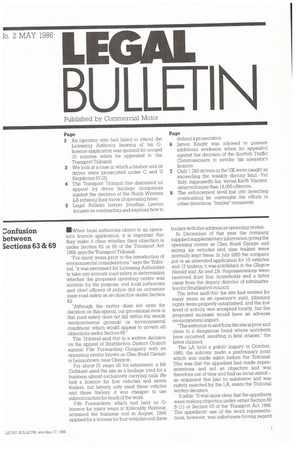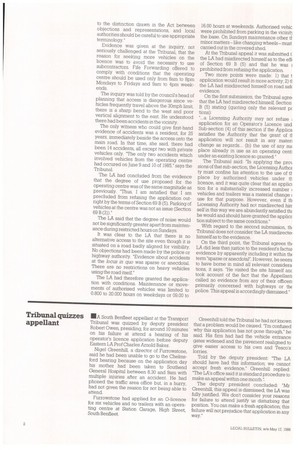confusion between Sections 63 & 69
Page 31

Page 32

If you've noticed an error in this article please click here to report it so we can fix it.
• When local authorities object to an operator's licence application, it is important that they make it clear whether their objection is under Section 63 or 69 of the Transport Act 1968, says the Transport Tribunal.
"For many years prior to the introduction of environmental considerations." says the Tribunal, "it was necessary for Licensing Authorities to take into account road safety in determining whether the proposed operating centre was suitable for the purpose, and local authorities and chief officers of police did on occasions raise road safety as an objection under Section 63.
"Although the matter does not arise for decision on this appeal, our provisional view is that road safety does not fall within the words 'environmental grounds or 'environmental conditions' which would appear to govern all objections under Section 69."
The Tribunal said that in a written decision on the appeal of Strathkelvin District Council against Fife Forwarding Company with an operating centre known as Glen Road Garage in Lennoxtown, near Glasgow.
For about 25 years till his retirement, a Mr Cuthbert used the site as a haulage yard for a business almost exclusively carrying nails. He had a licence for five vehicles and seven trailers, but latterly only used three vehcles and three trailers; it was cheaper to use subcontractors for much of the work.
Fife Forwarders, which had held an 0licence for many years at Kirkcaldy Harbour, acquired the business and in August, 1984, applied for a licence for four vehicles and three trailers with that address as operating centre,
In December of that year the company supplied supplementary information giving the operating centre as Glen Road Garage and saying six vehicles and nine trailers were normally kept there. In July 1985 the company put in an amended application for 10 vehicles and 15 trailers; it was published in the Glagow Herald and As and Ds. Representations were received from four households and a letter came from the deputy director of administration for Strathkelvin council,
The letter said that the site had existed for many years as an operator's yard, planning rights were properly established, and the low level of activity was accepted locally, but the proposed increase would have an adverse environmental impact.
The entrance to and from the site is poor and close to a dangerous bend where accidents have occurred, resulting in fatal injuries," the letter claimed.
The LA held a public inquiry in October, 1985; the solicitor made a preliminary point which was made again before the Tribunal. This was that the appellant had made representations and not an objection and was therefore out of time and had no locus standi an argument that had no substance and was rightly rejected by the LA, states the Tribunal written decision.
It adds: "It was quite clear that the appellants were making objection under either Section 69 B (1) or Section 63 of the Transport Act 1968. The appellants' use of the word representations, however, was unfortunate having regard to the distinction drawn in the Act between objections and representations, and local authorities should be careful to use appropriate terminology."
Evidence was given at the inquiry, not seriously challenged at the Tribunal, that the reason for seeking more vehicles on the licence was to avoid the necessity to use subcontractors. Fife Forwarding offered to comply with conditions that the operating centre should be used only from Barn to 8pm Mondays to Fridays and 9am to 4pm weekends.
The inquiry was told by the councils head of planning that access is dangerous since vehicles frequently travel above the 30mph limit, there is a sharp bend to the west and poor vertical alignment to the east. He understood there had been accidents in the vicinity.
The only witness who could give first-hand evidence of accidents was a resident, for 25 years, immediately beside the access onto the main road. In that time, she said, there had been 14 accidents, all except two with private vehicles only. "The only two accidents which involved vehicles from the operating centre had occured on June 9 and 10 of 1985," says the Tribunal.
The LA had concluded from the evidence that the degree of use proposed for the operating centre was of the same magnitude as previously. "Thus, I am satisfied that I am precluded from refusing the application outright by the terms of Section 69 B (5). Parking of vehicles at the centre was not an issue (Section 69 B (3))."
The LA said that the degree of noise would not be significantly greater apart from maintenance during restricted hours on Sundays.
It was clear to the LA that there is no alternative access to the site even though it is situated on a road badly aligned for visibility. No objections had been made by the police or highway authority. 'Evidence about accidents at the locus in quo was sparse or anecdotal. There are no restrictions on heavy vehicles using the road itself."
The LA had therefore granted the application with conditions. Maintenance or movements of authorised vehicles was limited to 0.800 to 20.000 hours on weekdays or 09.00 to 16.00 hours at weekends. Authorised vehic were prohibited from parking in the vicinit; the base. On Sundays maintenance other tl minor matterslike changing wheels must carried out in the covered shed.
At the Tribunal appeal it was submitted t: the LA had misdirected himself as to the effi of Section 69 B (5) and that he was i prohibited from refusing the application.
Two more points were made: 1) that t application would result in more activity; 2) tl the LA had misdirected himself on road sak evidence.
On the first submission, the Tribunal agre that the LA had misdirected himself, Section B (5) stating (quoting only the relevant pc tions): "...a Licensing Authority may not refuse application for an Operator's Licence tuid Sub-section (4) of this section if the Applica satisfies the Authority that the grant of ti application will not result in any materi change as regards... (b) the use of any suc place already in use as an operating cent: under an existing licence so granted."
The Tribunal said: "In applying the proN sions of that sub-section, the Licensing Authoi ty must confine his attention to the use of th place by authorised vehicles under th licence, and it was quite clear that an applici tion for a substantially increased number ( vehicles and trailers was a material change c use for that purpose. However, even if th Licensing Authority had not misdirected hin self in this way we are abundantly satisfied thi he would and should have granted the applicz tion subject to the same conditions."
With regard to the second submission, th, Tribunal does not consider the LA misdirecte himself as to the evidence.
On the third point, the Tribunal agrees nit LA did less than justice to the resident's factua evidence by apparently including it within ths term "sparse or anecdotal". However, he seem to have borne in mind all relevant considera tions, it says. He visited the site himself anc took account of the fact that the Appellants called no evidence from any of their officers primarily concerned with highways or thE police. This appeal is accordingly dismissed."






















































































